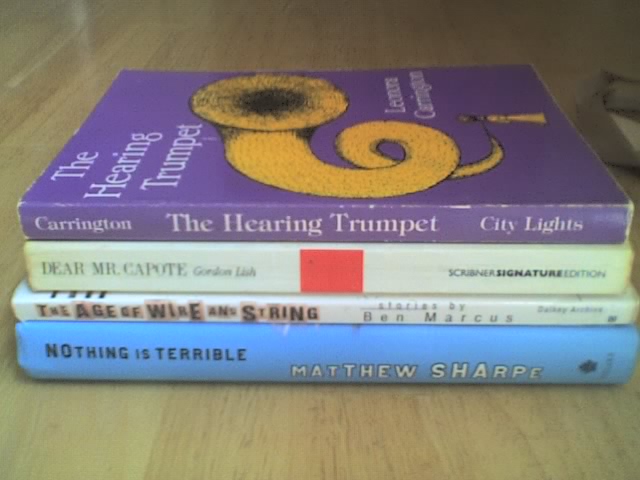“Every word was once an animal. – Emerson” – Marcus
Today, at Community Thrift on 17th and Valencia, I bought these books for $2.50. The first page of Dear Mr. Capote says “Ed Seifert” in pencil. Wonder if he’s related to George, who won the Super Bowl. Jaroslav won the Nobel Prize. My family farmed the rim of the Dust Bowl and nearly made it stinking rich off a bunch of black sand but didn’t. It seems “Seifert” comes from “cipher.” Encoding words is a form of mathematics. “Mathematics is the supreme nostalgia of our time.” – Michael Marcus
Tomorrow I’m reading at Amnesia, at nine o’clock, with Lindsay Hunter, Amelia Gray, and Aaron Burch. Wearing a coonskin cap and a corduroy suit, I will read from my novel for the very first time. The novel is called A Dog On Onondaga. I vow to never finish writing it, but to self-publish new handbound editions whenever I feel like it. Maybe you think that’s vain. Sometimes I stare in the mirror for oceans of time, for no reason. Your opinion of me is so much sand on the beach of yesterday. Three days ago part of me did something immoral; the rest of me has only begun to feel bad. Another part of me wants desperately to be lost in the desert with a backpack full of books; but that can probably wait until the winter of my content. I plan to go to the community pool tomorrow, so that my body will remember what it was like when it was a word. READ MORE >
Grace Paley takes heads

She does. Honest. Takes head and doesn’t give them back.
Example from the story “Wants”:
He had had a habit throughout the twenty-seven years of making a narrow remark which, like a plumber’s snake, could work its way through the ear down the throat, halfway to my heart. He would disappear, leaving me choking with equipment.
Here’s what I notice about this: that shouldn’t have worked. The metaphor—the plumber’s snake entering the ear and making its way near the heart—should come off as cliche. Familiar. A little silly. Following it up with “…leaving me choking with equipment,” redeems it.
Writers: push a cliche to the point where it strains to near snapping and you revive it.
Man, that’s a funny line.


